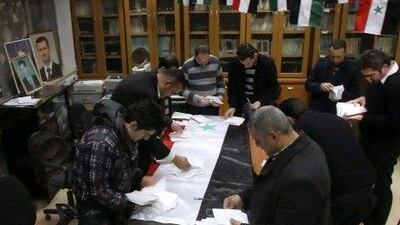DAMASCUS // Syria has a new constitution after almost 90 per cent of voters in Sunday's referendum supported the revised legal framework, government officials said yesterday.
The interior minister, Mohammad Al Shaar, said 89.4 per cent of those taking part had backed the plan to replace the 1973 constitution, in a free and transparent ballot.
But opposition groups, which called for a boycottwhich called for a boycott, had anticipated such a result and said all elections in Syria are rigged.
"No matter how many people actually take part in any vote here, the regime always announces some number larger than 75 per cent supported its plans," said a dissident lawyer. "There is no independent monitoring, there is no fairness, it's meaningless."
Turnout was 57.4 per cent, officials said, with 8.38 million of the 14.6 million eligible voters participating.
Anecdotally, turnout was extremely low, even non-existent, in protest areas, such as the Bab Amro neighbourhood of Homs. Participation was high in zones of support for President Bashar Al Assad.
"There has been a large turnout despite threats made by armed terrorist groups in some regions," Gen Al Shaar said.
The result means the new constitution, promised since the start of the uprising 11 months ago, is now in force. It ostensibly ends decades of Baath party monopoly over Syrian political life and introduces a multiparty system, with a parliamentary election due no later than 27 May.
Mr Al Assad has made constitutional change the centrepiece of his reform agenda, having already introduced legislation governing political parties, elections and the media. All have been widely criticised for doing nothing to break the ruling elite's stranglehold on power, but have won support from Russia and China, key diplomatic allies.
The preamble to the new laws describes the constitution as "the culmination of the people's struggle on the road to freedom and democracy" and says it will guarantee "public freedoms, human rights, social justice, equality, equal opportunities, citizenship and the rule of law".
But sweeping presidential powers remain intact.
While restricting future presidents to two terms of office - a maximum of 14 years in power - the legal code says this will not be retroactive. Mr Al Assad, who is serving his second seven-year term in charge, will therefore potentially be able to rule until 2028.
Emergency clauses in the new constitution allow for that to be extended indefinitely in the event that no presidential election is possible.
Syrian lawyers and analysts have been highly critical of the constitution - drawn up by a hand-picked presidential committee - warning any changes are largely cosmetic and will not rein in the abuses of security services that dominate everyday life in the country.
Opposition groups, demanding Mr Al Assad step down, have said it is too little, too late to prevent the revolt from spiralling further out of control. More than 7,000 people have been killed by security forces since a pro-democracy uprising began in March, according to human-rights groups. Syrian officials say more than 2,000 security personnel have been killed in the same period, blaming "armed terrorist gangs".
psands@thenational.ae

